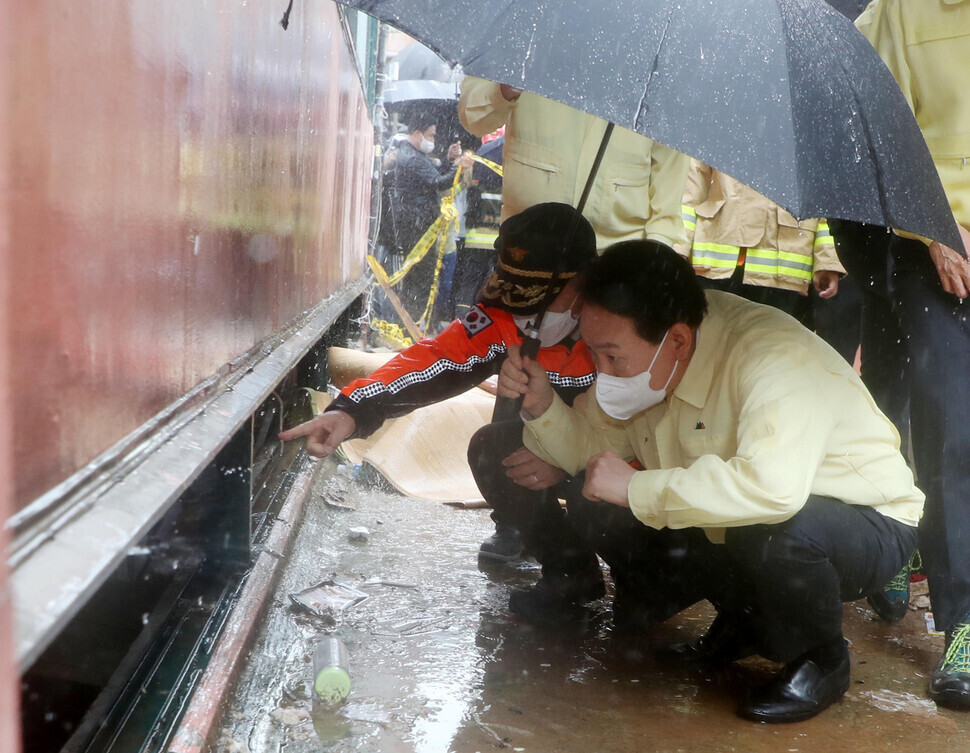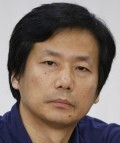hankyoreh
Links to other country sites 다른 나라 사이트 링크
[Column] Yoon’s first 100 days should open our eyes to pitfalls of presidential system


As South Korean President Yoon Suk-yeol passes his first 100 days in office, three scenes come to mind.
First was a Q&A session while Yoon was on his way to work on July 5. When a reporter mentioned that Yoon was facing criticism for his personnel appointments in connection with nominees Song Ok-rial, Park Soon-ae and Kim Seung-hee, Yoon offered the following retort: “Did you see such fine people among the ministers appointed under the previous administration?”
By that point, personnel appointments were already the No. 1 reason that Yoon’s job performance was being rated poorly. Few took Yoon’s attitude as a sign of backbone or chutzpah. It just reinforced his reputation of being aloof and arrogant.
Dovetailing with a controversy over first lady Kim Keon-hee bringing along personal friends on an official trip to Europe and allegations of cronyism in people hired to work in the presidential office, Yoon’s approval rating had already fallen below 40% in a Gallup Korea poll published on July 8.
The second scene was the text message that Yoon sent to Kweon Seon-dong, floor leader of the ruling People Power Party (PPP), on July 26. Yoon wrote that the PPP was better off now that it had replaced the party leader (Lee Jun-seok) who’d been sniping at his own colleagues. Yoon followed that up with a mysterious emoji, which some had initially mistaken for a fish, but which turned out to be a cartoon cherry making the “thumbs up” sign. Lee later said he’d never had the pleasure of receiving that emoji.
That gave the lie to Yoon’s public statement that he was too busy looking after the public to pay attention to party business. Few took this as the youth-oriented and open-minded attitude of an individual who uses emojis to communicate with party leadership. It aggravated strife and division within the PPP, leading to a flurry of resignations of pro-Yoon members on the PPP’s supreme council, the transition to an interim leadership structure, and Lee’s request for an injunction against those measures.
In a Gallup Korea poll released on July 29, Yoon’s approval rating plummeted below 30%.
The third scene was Yoon’s departure from the presidential office at the stroke of 6 pm on Aug. 8 as rain descended in sheets. As Gangnam was inundated by a 100-year storm and a family perished in a semi-basement unit in the city’s Sillim neighborhood, Yoon was reportedly being briefed on the situation and ordering a response by telephone from his hilltop Acrovista apartment. Who knows how many phone calls were actually made?
“While I was leaving work [yesterday], I noticed that other apartments were already being flooded,” Yoon said while visiting the scene of the disaster in the Sillim neighborhood.
Upon returning to work on the day of the flooding after a vacation, Yoon had said that his vacation had been a chance to reflect on how he should serve the will of the people while always keeping his passion fired up.
And yet, he continued on his way home while seeing apartments getting flooded. He must have ice in his veins.
“Is the president supposed to stay at the office just because of some rain?” mused Kang Seung-kyu, senior secretary to the president for his civil and social agenda, on Aug. 10. That’s an impressive level of harmony for the president and his advisor to display.
We’ve already seen more examples than we can count of Yoon’s ignorance and apathy for public livelihood issues.
Few regarded Yoon’s decision to clock out right at 6 on the dot in the middle of a torrential downpour as a commendable example of braving criticism to establish a healthy work-life balance. The hashtag #stateofanarchy spread on social media, and Yoon’s approval rating remained below 30% for the third week in a row in a Gallup Korea poll released on Aug. 12.
Yoon’s first 100 days in office, as epitomized by these three scenes, can be aptly summed up by the Korean proverb, “Advertising a sheep’s head but selling dog meat.” Yoon can talk the talk, but he can’t walk the walk.
Yoon bragged about “such fine people” after displaying some of Korea’s worst-ever favoritism in public appointments. During a press conference on his first 100 days in office, he responded to a question about Lee, the former PPP leader, by claiming to be too focused on issues of public safety and livelihood to pay attention to other politicians’ remarks. And after promising not to let his passion cool, he breezed out of the office right on the dot.
There could hardly be a better way to sum up the chronic disconnect between Yoon’s words and actions. I wish I could send a “cherry thumbs up” to Lee just for bringing this up.
Yoon’s nearly unprecedented free fall over the past 100 days is not only galvanizing opposition to Yoon and his administration but also inspiring skepticism of and reflection on Korea’s presidential system itself. With a new president in office, a sense of crisis is spreading in Korean society, as the government steps aside and leaves people on their own to face challenges ranging from COVID-19 to torrential downpours. But we’ve only seen 5% of Yoon’s presidency, and 57 months remain.
The tragedy of the presidential system is that the president can’t be held accountable in any significant way for the immense responsibility for running the country with which he or she is entrusted while in office.
Korea’s separation of powers and checks and balances are weaker than in the US, for example. The only escape hatch is impeachment, and that’s limited to violations of the laws and the Constitution — it’s basically impossible to punish a president for indolence or incompetence.
It’s time for us to ponder fundamental ways to ensure the failure of a president doesn’t lead, once again, to the failure of the state or nation. That’s the takeaway of Yoon’s first 100 days in office.
Please direct questions or comments to [english@hani.co.kr]

Editorial・opinion
![[Editorial] Penalties for airing allegations against Korea’s first lady endanger free press [Editorial] Penalties for airing allegations against Korea’s first lady endanger free press](https://flexible.img.hani.co.kr/flexible/normal/500/300/imgdb/original/2024/0502/1817146398095106.jpg) [Editorial] Penalties for airing allegations against Korea’s first lady endanger free press
[Editorial] Penalties for airing allegations against Korea’s first lady endanger free press![[Editorial] Yoon must halt procurement of SM-3 interceptor missiles [Editorial] Yoon must halt procurement of SM-3 interceptor missiles](https://flexible.img.hani.co.kr/flexible/normal/500/300/imgdb/child/2024/0501/17145495551605_1717145495195344.jpg) [Editorial] Yoon must halt procurement of SM-3 interceptor missiles
[Editorial] Yoon must halt procurement of SM-3 interceptor missiles- [Guest essay] Maybe Korea’s rapid population decline is an opportunity, not a crisis
- [Column] Can Yoon steer diplomacy with Russia, China back on track?
- [Column] Season 2 of special prosecutor probe may be coming to Korea soon
- [Column] Park Geun-hye déjà vu in Yoon Suk-yeol
- [Editorial] New weight of N. Korea’s nuclear threats makes dialogue all the more urgent
- [Guest essay] The real reason Korea’s new right wants to dub Rhee a founding father
- [Column] ‘Choson’: Is it time we start referring to N. Korea in its own terms?
- [Editorial] Japan’s rewriting of history with Korea has gone too far
Most viewed articles
- 160% of young Koreans see no need to have kids after marriage
- 2Presidential office warns of veto in response to opposition passing special counsel probe act
- 3[Editorial] Penalties for airing allegations against Korea’s first lady endanger free press
- 4[Editorial] Japan’s rewriting of history with Korea has gone too far
- 5Japan says it’s not pressuring Naver to sell Line, but Korean insiders say otherwise
- 6For survivor, Jeju April 3 massacre is a living reality, not dead history
- 7[Column] Park Geun-hye déjà vu in Yoon Suk-yeol
- 8Months and months of overdue wages are pushing migrant workers in Korea into debt
- 9[Guest essay] Maybe Korea’s rapid population decline is an opportunity, not a crisis
- 10Hybe-Ador dispute shines light on pervasive issues behind K-pop’s tidy facade